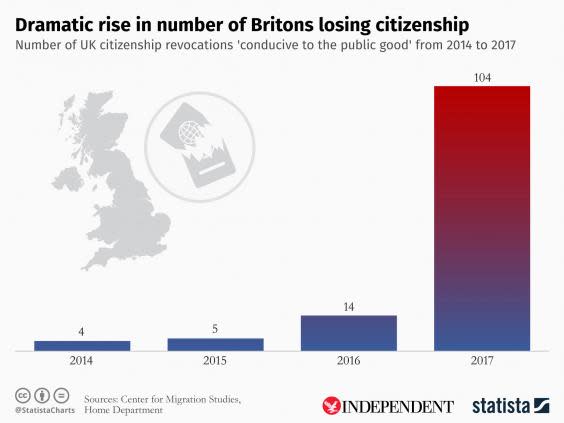Shamima Begum: Isis bride’s newborn son will retain British citizenship, Sajid Javid suggests
Shamima Begum’s child will remain a British citizen despite the government’s decision to strip her UK nationality, Sajid Javid has suggested.
While insisting he could not discuss individual cases, the home secretary told MPs: “Children should not suffer, so if a parent does lose their British citizenship that does not affect the rights of their child.”
Ms Begum’s son, Jarrah, was born on Saturday – three days before relatives were sent a letter telling them the home secretary had made an order removing her British citizenship.
Although the baby’s father is a Dutch Isis fighter who Ms Begum married in Syria, a lawyer told The Independent he is automatically a British citizen “by descent”.
Chris Cole, head of immigration at Parker Rhodes Hickmotts, said British citizenship is passed down one generation to children born abroad.
“In theory either of her parents could apply for a British passport for him and he could come to the UK,” he added.
“There are practical difficulties, but once the child is old enough to make their own application for a passport there is nothing to stop them coming here.”
Mr Cole said the child could also be entitled to Dutch citizenship, depending on whether the Netherlands recognises the parents’ marriage.
Ms Begum and her baby remain detained in a camp controlled by the Syrian Democratic Forces, while her husband is imprisoned elsewhere.
Kurdish officials told The Independent she would not be able to leave without governmental assistance, and Bangladesh has not made any move to give any help.
Chiranjiv Sarker, head of dual nationality issues at Dhaka’s foreign ministry, said the government was aware of the case but had not been approached by Ms Begum’s representatives.
He said the ministry would need to try to verify Ms Begum’s Bangladeshi heritage to assess any possible eligibility for citizenship.
Her family’s lawyer told The Independent the UK had made her “to all practical purposes stateless” and vowed to launch a legal challenge, but Mr Javid insisted he had complied with international law when challenged by MPs.
Liberal Democrat former minister Sir Ed Davey highlighted two previous cases where the government was found to have acted unlawfully by removing British citizenship from two men of Bangladeshi heritage.
The shadow home secretary Diane Abbott asked: “Why is he going forward with the same strategy now?”
She highlighted Article 15 of the Universal Declaration of Human Rights, which says “everyone has the right to a nationality” and that “no one shall be arbitrarily deprived of their nationality”.
Joanna Cherry, a Scottish National Party MP, said Ms Begum was “our problem” and could provide valuable intelligence and insight into how she was radicalised.
“Why is [Mr Javid] washing his hands of this problem?” she asked. “Is he more interested in playing to the populist gallery than respecting the rule of law?”
Home Affairs Committee chair Yvette Cooper questioned how the British government would react to other countries taking the same step to make former dual nationals the UK’s responsibility.

Addressing the House of Commons, Mr Javid said that in each deprivation case he looks at the evidence to “determine the threat that individual may pose to the country”, but will also “make sure that if we go ahead that they will not be left stateless”.
“I have to be – in every case – absolutely confident that it is not only conducive to the public good but legally proper and correct, and compliant with both international and any relevant domestic law,” the home secretary added. “To keep this country safe, we must be prepared to make tough decisions.”
The government estimates that of around 900 people of “national security concern” who left the UK to engage with the conflicts in Syria and Iraq, around 40 per cent have returned and 20 per cent have been killed.
Those who came back have all been investigated, and the majority have been assessed to pose no or a low security risk, Mr Javid said.
“Those who stayed include some of the most dangerous, including many who supported terrorism – not least those who chose to fight or to raise families in the so-called caliphate,” he added.
“They turned their back on this country… I have been resolute that, where those people pose any threat to this country, I will do everything in my power to prevent their return.”
